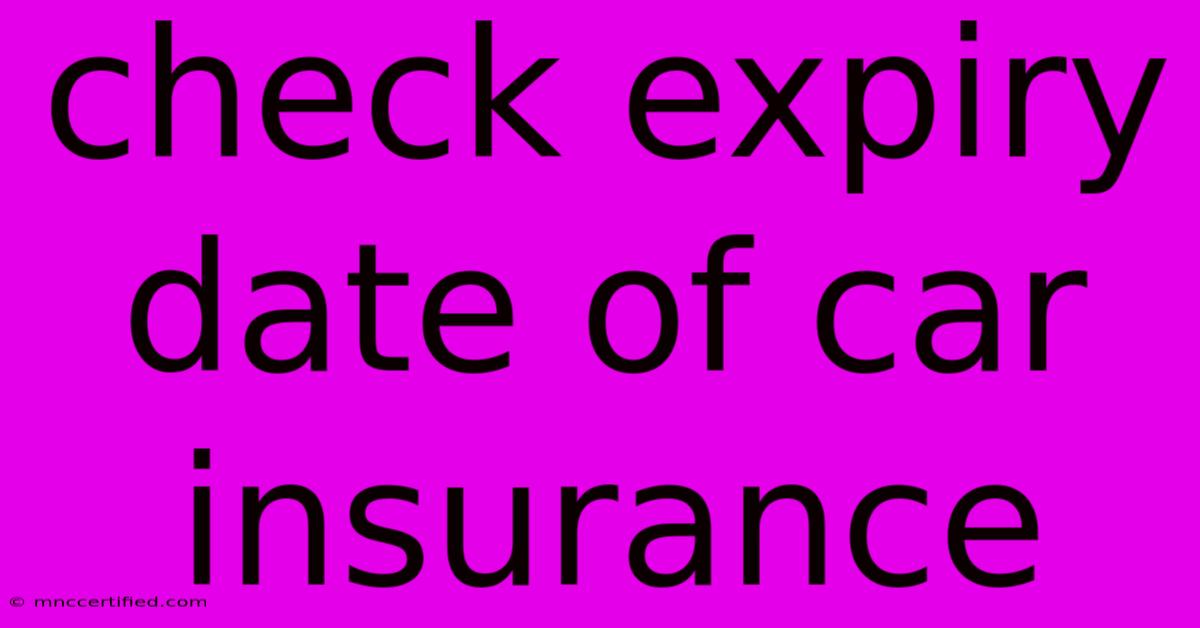Check Expiry Date Of Car Insurance

Table of Contents
How to Check Your Car Insurance Expiry Date: A Comprehensive Guide
Knowing when your car insurance expires is crucial. Driving without valid coverage can lead to hefty fines, legal trouble, and leave you financially vulnerable in case of an accident. This comprehensive guide will walk you through various methods to check your car insurance expiry date, ensuring you're always covered on the road.
Why Checking Your Car Insurance Expiry Date is Important
Failing to renew your car insurance before it expires has serious consequences. These include:
- Heavy Fines: Depending on your location, driving without insurance can result in significant fines and potential license suspension.
- Legal Complications: In the event of an accident, you'll be held personally liable for damages if your insurance is lapsed. This could lead to substantial financial burdens.
- Lack of Coverage: The most obvious consequence is the absence of financial protection in the event of an accident, theft, or other covered incidents.
Proactive insurance management is key to peace of mind. By regularly checking your expiry date, you avoid these potential problems and maintain legal compliance.
Methods to Check Your Car Insurance Expiry Date
Several ways exist to quickly and easily verify your car insurance expiry date. Let's explore the most common methods:
1. Check Your Insurance Policy Documents
The most straightforward method is to review your physical or digital insurance policy documents. These documents typically clearly state the policy start date and policy expiry date.
- Physical Documents: If you received a paper copy of your policy, look for the highlighted dates usually found on the first page or in a summary section.
- Digital Documents: If you have a digital copy (email, online account), the expiry date will be easily accessible. Most insurance providers offer online portals to manage your policy.
2. Access Your Insurance Company's Online Portal
Most insurance providers offer online customer portals. Logging into your account provides access to your policy details, including the crucial expiry date information. This method offers quick access and eliminates the need to search through physical documents. Look for a section labeled "Policy Details," "My Policy," or similar.
3. Contact Your Insurance Provider Directly
If you're unable to locate your policy documents or access your online portal, contacting your insurance provider directly is always an option. They will be able to quickly provide you with your policy expiry date. You can usually reach them by phone, email, or through their website's contact form.
4. Check Your Email Inbox
Many insurance companies send renewal reminders a few weeks before your policy expires. Check your email inbox for messages from your insurance provider. These reminders often contain crucial information like the expiry date and instructions on how to renew your coverage.
5. Review Your Bank Statements or Credit Card Transactions
If you pay your premiums automatically through your bank account or credit card, you can often find the payment details on your statements. These statements usually include the policy number and sometimes the expiry date. However, this method may not always provide the expiry date directly.
Setting Reminders to Avoid Lapses
To prevent accidentally letting your insurance lapse, consider these proactive strategies:
- Set Calendar Reminders: Use your phone or computer calendar to set a reminder a month or two before your policy expires.
- Utilize Email Reminders: Sign up for email notifications from your insurance provider to receive renewal alerts.
- Automatic Renewal: Many insurance companies offer automatic renewal options, ensuring continuous coverage without manual intervention. This is often the easiest way to avoid lapses.
Conclusion: Staying Covered on the Road
Regularly checking your car insurance expiry date is a crucial aspect of responsible driving. Using the methods outlined above, you can easily stay informed and avoid the potential legal and financial repercussions of driving without valid insurance. By staying proactive and implementing reminder systems, you can ensure you're always covered on the road, providing peace of mind and protecting yourself from unnecessary risks.

Thank you for visiting our website wich cover about Check Expiry Date Of Car Insurance. We hope the information provided has been useful to you. Feel free to contact us if you have any questions or need further assistance. See you next time and dont miss to bookmark.
Featured Posts
-
Complete Coverage Insurance Agency
Nov 17, 2024
-
Australia Vs Pakistan 2nd T20 Highlights
Nov 17, 2024
-
At Home Sleep Apnea Test Insurance
Nov 17, 2024
-
Divall Insured Income Properties 2
Nov 17, 2024
-
Pitt Vs Clemson Announced Starting Lineup
Nov 17, 2024